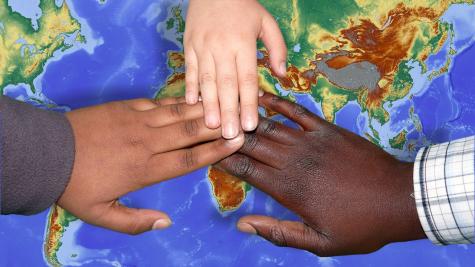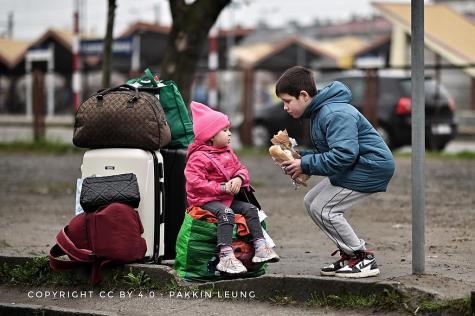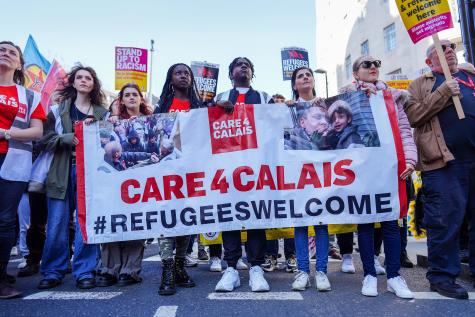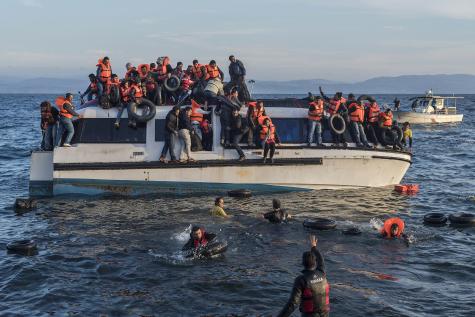REFUGEES & Migrants

REFUGEES & MIGRANTS – International Guide
A refugee is a person forced to flee their home country due to violence, conflict, poverty, persecution, or natural disaster. There are currently 108 million refugees – 52% of which are from Syria, Ukraine, and Afghanistan. Children make up 34% of all refugees, a staggering 37 million.
Refugees are unable to return home, and so need specific legal protections to ensure their wellbeing and dignity are safeguarded. Migrants leave their homes in search of a better quality of life by finding work, education, or to be reunited with their families. They are able to safely return home, and do not receive the same protections as refugees and asylum seekers.
Better World Info provides an excellent ➡️ platform on refugees and migrants. With 4,500 links to essential resources such as news portals, local and regional organisations, and on key issues such as detention, the impact of covid-19 on refugees, refugees and international development, integration of foreign citizens, internally displaced people (IDPs), refugee women and children, undocumented migrants, and the importance of remittances.
Refugees are some of the most vulnerable people in the world, it is our collective responsibility to uphold the rights and dignity of all those who are seeking safety and freedom for themselves and their families.
Learn about the UN Global Compact on Refugees led by the UNHCR, designed to promote international cooperation and a sustainable solution for the challenges related to unprecedented levels of refugees. It assists both host communities and refugees to ensure that everyone benefits.
Better World Info supports awareness days such as World Refugee Day and International Migrants Day where we honour the courage and resilience of refugees around the world.

For up to the minute news and critical comment follow our curated Twitter list on refugees where you will find human rights experts, NGOs, migrant portals, refugee specialists, search and rescue operators and much more.
For further insight checkout our related categories on the United Nations, international development, conflict regions, and human rights.
German speakers can head to our partner site Bessere Welt Info and the category Flüchtling where you will find 3,000 links on the topic from a European perspective.
Why are there More Refugees Now than Ever Before?
The number of refugees has doubled in a decade, surpassing the 100 million mark for the first time ever in 2022. Estimates predict that there could be one billion people at risk of displacement by 2050.
Man-made factors are driving this worrying trend with environmental change, conflict, and civil unrest as the predominant causes.
Climate change has increased the frequency of weather-related disasters 5 fold in the last 50 years. The 2022 Pakistan floods resulted in the displacement of 7.9 million people, the deaths of 1,700 people, and a financial cost of $14.9 billion.
There are now 30.7 million climate refugees worldwide. Flooding, droughts, desertification, heatwaves, and sea-level rise are reducing quality of life, agricultural output, and income which leads to extreme poverty, hunger and famine. With 78% of people in developing countries relying on agriculture to survive, this makes them both the most severely affected by the climate crisis, and the ones least able to adapt.
Conflict is a huge driver of displacement. 2 billion people are currently living in areas with violent conflict - the equivalent of one quarter of the human population. The world is currently experiencing the highest number of conflicts since 1945, many of them in the poorest regions of Africa.
During war, civilians are always the first to lose. They are left surrounded by violence, death, and fear, forced to leave their homes, possessions, jobs, schools, and communities. Refugees have to take perilous migrant routes only to find deplorable conditions in border camps once they arrive.

The Russian war in Ukraine drove the largest annual increase in refugees in decades. Aside from the resulting humanitarian crisis, it has also been a major cause of economic instability including massive inflation, the global food crisis, and worldwide grain shortages. Coupled with the fallout from the coronavirus pandemic, the number of people worldwide living in extreme poverty has risen by 70 million.
The ongoing conflict in Sudan has created a refugee crisis in Africa. Half a million people have now fled the country, with a further 2 million internally displaced.
Forced to Flee – Which Countries do Refugees come from?
Syria - 6.5 million. Most Syrian refugees left after a peaceful uprising escalated into a brutal civil war. The recent earthquake in Syria and Turkey has worsened the situation.
Ukraine - 5.7 million. The Russian invasion in Ukraine created Europe's largest forced displacement since WWII. In addition to those who sought refuge abroad, 6 million Ukrainians have been internally displaced.
Afghanistan - 5.7 million. Afghanistan represents one of the largest long-term refugee challenges in the world. The 20-year war on terror and the subsequent Taliban takeover has created mass poverty, unemployment, and the complete rollback of women's rights.
Venezuela - 5.4 million. Almost a decade of political and economic instability driven by massive U.S. sanctions has forced Venezuelans to neighbouring South American countries in search of food, employment, and a better life.
South Sudan - 2.2 million. Violent conflict coupled with natural disasters have created a refugee crisis in Africa as access to food, water, healthcare, sanitation, and education became impossible in many places.
Myanmar - 1.2 million. The heavily persecuted Rohingya people fled Rakhine state after violence and human rights violations displaced many of the now stateless citizens into the world's largest refugee camp Kutupalong in Bangladesh.
Here you can find further information on refugees from Palestine, Libya, and North Africa.

Hope Away from Home - Where do Refugees go?
Refugees often do not have a choice in the country where they will be hosted, and many migrant routes are incredibly dangerous, often made worse by cruel migration policies and exploitative people smugglers. The number of migrants crossing the Mediterranean to Europe reached a peak in 2015 (more than one million), however the journeys seem to be becoming deadlier, with more than 2,000 losing their lives in 2022 alone.
Once migrants reach their destination, they are placed into overwhelmed refugee camps where food, water, shelter, sanitation, childhood education and healthcare are in short supply. Disease is a big problem, as well as lack of maternal care, sexual and reproductive health, violence, mental health issues, and malnutrition.

Better World Info offers comprehensive guides to the places which face the biggest challenges regarding refugees and their protection -
A Shared Future – How can we Help Refugees?
Refugees face many barriers once settled in their host countries. Many have been separated from their families, suffered unimaginable loss and trauma, they may not speak the language, and will be unfamiliar with their new culture.
Without integration, refugees become isolated, and hostility can grow in communities where newcomers are seen as a problem rather than an asset. Empathy and solidarity pave the way to ending to harmful stereotypes, discrimination, or hate.
Successful integration of refugees includes providing education, job opportunities, and social support. A balanced and cooperative migration policy is crucial to meet the humanitarian needs of refugees, while sharing the burden across countries.
Many refugees bring valuable skills, experience, and talents that contribute to the development and growth of their host countries. When refugees are given the opportunity to develop their potential, they can contribute to enriching diversity and cultural exchange.
We have a global responsibility to increase efforts to address the root causes of displacement, promote a culture of peace, and create the conditions for the safe return of refugees to their home countries.
“Refugees represent the very best of the human spirit. They need and deserve support and solidarity — not closed borders and pushbacks,” UN Secretary-General António Guterres.
Author: Rachael Mellor 29.06.23 licensed under CC BY-ND 4.0
For further reading on Refugees and Migrants see below ⬇️
Info on REFUGEES & Migrants
- News[35]
- General Info[71]
- Organizations[93]
- Pope Francis[26]
- European Refugee Crisis[767]
- Greek Islands & Moria on Lesbos[130]
- US / Mexico Border[753]
- Asylum[94]
- Detention[45]
- North African Refugees[155]
- Undocumented Migrants and Refugees[108]
- World Refugee Day - June 20[207]
- International Migrants Day - December 18[111]
- Lipa and Bihac in Bosnia[31]
- Women Migrants[180]
- Belarus - EU Border Crisis[141]
- Calais (France)[85]
- Refugee & Migrant Children[73]
- Selected Articles[258]